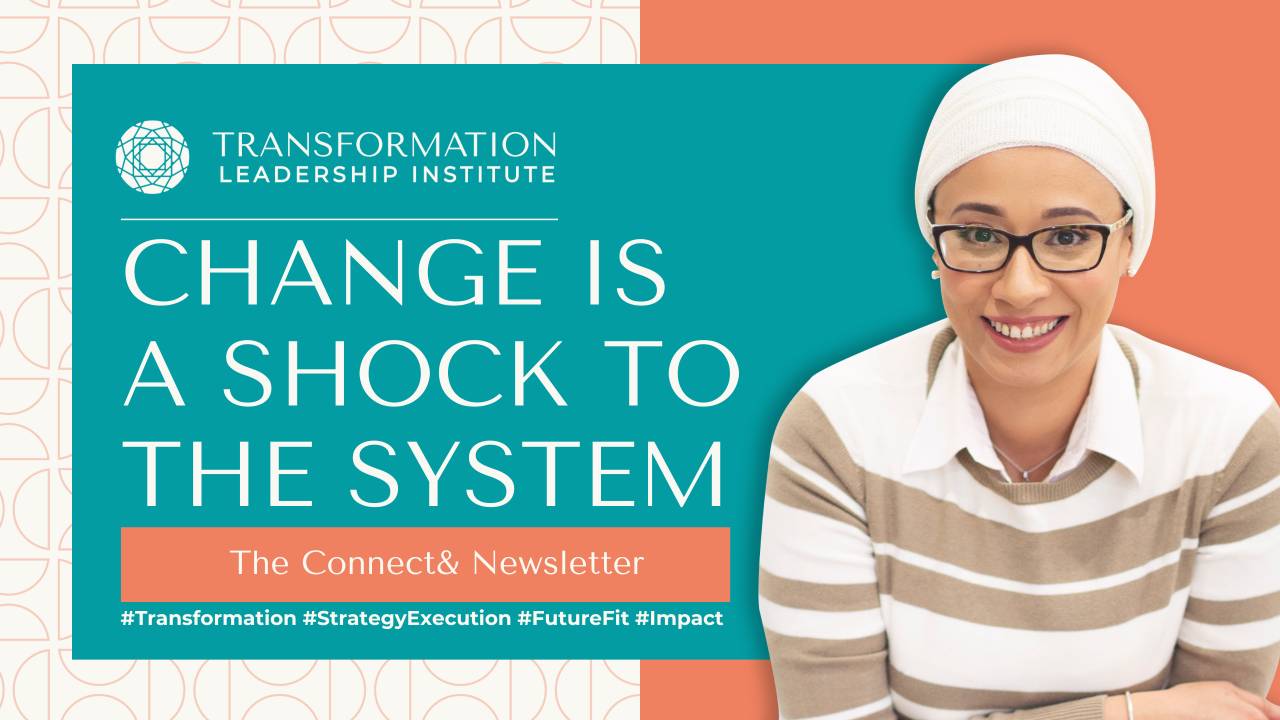Change is a Shock to the System
Nov 21, 2025
Over the weekend and early this week, I experienced a recurrence of an old shoulder injury. I required invasive intervention by my Osteo with long, thin needles to go inside my shoulder muscles and neck side muscles to force release the muscles by creating micro injuries and trauma .. It was excruciating, but what was even more unbearable was the pain from the muscle contracting and squeezing the nerves in that area. Really overwhelming pain that I could not function with. Yesterday was a recovery day after this intervention, hence the delay in sending out my weekly newsletter.
The parallel I can’t ignore
This situation got me thinking... I believe that life is the best teacher if you are really listening. As you can imagine, I was physically and emotionally drained. Didn't want to do any work. was on social media and saw a few posts on books that were at first interesting.
In this day and age, there is finally more language and attention on what successful mid-aged women are going through. Bodies are shifting. Energy is no longer as dependable as it once was. Identity can feel confusing one day and almost too clear the next. Menopause and pre-menopause are part of it, as is the quiet mental load of decisions that used to be automatic but now require re-examination. I see books and conversations about redefining success, and I’m glad they exist; yet, they also trigger something in me as a woman in midlife who has built a strong career. Those titles make me cringe. They signal more change, which means more energy required, which means more things to do, more things to rethink, and more things to let go of.
Most of these books sound like 20% “I know what you’re going through” and 80% “here’s what you need to do.” I hate those books. Most of us already know at least one thing that needs to change out of the ten on any list. What I need first is to decompress. I need to let things out. I need to become more aware of what is really happening inside me, and I need to be genuinely heard.
I need permission to feel okay about not being the strong, successful, 'I-can-do-anything' person all the time. I want to feel more normal and more human, with less façade and more me.
I want the kind of moments I often reserve for a private journal. I need space for self-doubt, self-compassion, and genuine self-talk. I need 80% realisation and space, and 20% how-to. The same ratio would also serve many men, because this is a human condition. We all need more humane time and space, more heart and soul, and less pressure to grind through with our brains and bodies alone.

Why does this matter in the organizational context?
Organisations are built from people, not one or two or ten, but tens, hundreds, and sometimes thousands. The same need exists there: space to listen, to decompress, to realise, to be heard, and to recharge our batteries. When batteries are depleted, the typical response is restructuring, introducing redundancies, and making further changes.
If we want to soften the tone, we use phrases like 'brain-friendly change, 'building a thriving culture,' and 'better engagement through empowerment.' These are phrases that have been recycled so often that they start to lose meaning.
I’m arguing for the same 80/20 shift inside organisations. If we prioritise realising, decompressing, and creating space, the 20% that follows will be far more on point. We don’t need countless changes. We need one or two humane, fundamental changes that put us on the right path.
Currently, we are doing the opposite, and we are feeling the cost in terms of low morale, resistance, reduced clarity, and questioning trust.
What decompression actually looks like
Decompression is not a luxury or an avoidance tactic. It is the precondition for honest decisions. It is the difference between chasing new initiatives and choosing the few moves that matter.
Here is what that looks like for me and for the teams I work with:
- Seasons, not sprints. We name the season we are in. We paint a picture of what our current landscape looks like. What feels heavy, where we feel unsure, what might be more difficult than what it should be, where we don't feel enough support, and areas we crave more clarity.... So we stop pretending everything is OK, or catastrophizing things. We need a solid understanding of what we collectively see and feel as a team..
- Private rooms for real talk. Individuals get protected time to say what is true without fixing it in the same breath. Teams get regular circles where the goal is to tell the truth and be heard before anyone proposes a plan.
- Subtraction before addition. We remove one commitment before adding another, and we make the removal visible so people see the weight coming off, not just the weight being moved around. Not everything requires a change program and a culture overhaul!
When we emphasise realisation, decompression, and space, we return to work with a cleaner intent. The next actions are smaller and sharper. The strategy is more focused. The meetings are shortened. The energy is redirected into impactful work instead of being wasted on performance around the work.
Are we contributing to making things more difficult than they need to be?
The emphasis on realisation and seeing change as a shock to an existing system is key in designing the necessary key changes and actually shifting reality.
I don't know where in the history of change or transformation it became a set of stacked projects and tactics rather than a co-designed experience, with cognitive and emotional culture levers, an integrated ecosystem thinking, and a definition of success at a 360-degree level.
Some organisations and leaders make change much more complicated than it is. By:
- Adding too much change
- Providing the team with a high-level "north star" and hoping they will figure it out
- Not investing time in seeing the organisation as a single, interconnected continuum that comprises ways of working, systems, culture, processes, experiences, promises, products, emotions, services, capabilities, capacity, legacy, and knowledge assets, among others.
- Clearly define what good looks like at a 360 degree (not just system go live, or announcing the org structure ... these are outputs and not outcomes, plus it doesn't say anything about what integrated success looks like)
- Not taking behavioural change and culture seriously.. and what I really mean is with depth, integrated to the other workstreams and starting from day 1.
When this happens, organisations demonstrate a lot of symptoms like
- Resistence
- Passive-aggressive behaviour
- Quite quitting
- Going in circles
- Team dynamics heightens
- Leadership teams feel too involved or disconnected from reality
- and more...
The answer is not consultants, doubling down, restructures, leadership development programs, change resistance thrown as an excuse left, right and centre, waiting for the CEO to decide for us ...
The answer is... back to what I started this article with.. You have flipped the 80/20 balance. You are creating change "causing trauma" to your system "organisation" by asking them to do more ... differently and quickly ... and in parallel to everything else.
It won't work even if it appears to be working; the long-term price will have to be paid, and it is expensive*.*
If this hits a nerve, this means it might already be at play.. And it can feel like quicksand and a spiral that is hard to break from. I have seen this many times. If you are an individual leader or an organisation that is ready to become truly forward-thinking and break normalised patterns. Then let's talk. Why? Because there is no time to entertain what used to work but no longer does. There is a lot at stake.
Comment down below and let's have a confidential conversation, or I can respond to you via Direct Message with my thoughts.
🎁 Did you know TLI is running a Black Friday Offer with up to 50% discount on select offerings? Message me with "BF", and I will send you the details
Insights: From questions I have been asked recently
Q: What does a healthy CEO intervention look like to ensure impactful change?
- Don’t be prescriptive. Start with listening and reflection so the next move is earned, not imposed.
- Redefine your role. See yourself as the enabler of change, not the author it.
- Coach your executives. Coach & mentor them on focus, trade-offs, and pacing so they can lead their own teams well.
- Define “good.” Spend time and energy in defining the outcomes and what good looks like from every angle. That's not being prescriptive, that's being clear.
- Less to become more. Choose fewer changes so your organisation's energy is more focused where it matters.
- Stop before you add. Call out the work to end, because teams default to piling on.
- Describe progress. Make clear what progress looks like this month and this quarter....
- Make it safe to say “not working.” Invite candour and protect the people who bring bad news early.
- Check in with yourself. With a coach or alone, ask who you need to be to make this work.
- Provide real support. Clarify what each executive and their team needs from you to succeed, and give it.
Q: What is the role of the Board in supporting their organisation to create healthy and impactful change?
- Set direction and success. Agree on the few outcomes that matter and the limits you won’t cross.
- Protect subtraction. Support the CEO when work is halted to make space for what matters.
- Ask for the learning and the thinking process. Request updates on what was tried, what moved, what stopped, and the next decision.
- Fund focus. Resource small, time-boxed pilots with one clear measure and shield them from competing asks.
- Model straight talk and care. Make it safe to say “not working,” and check the CEO’s capacity and support needs in every meeting.
Inside The Transformation Leadership Institute. My invitation to you!
The Transformation Leadership Institute has welcomed 3 heavyweight leaders into its highest membership tier, Inner Circle Mastermind. They joined to elevate their practice, reach new heights, some want to start their own practice, and, of course, to learn from one another.
- Sara, Director of Transformation & Strategy for a regional retail and hospitality group in Dubai, UAE.
- David, Head of Change & Transformation (Financial Services) from London, UK.
- Priya, Chief Transformation & Innovation Officer (Health Tech), Boston, USA.
Did you know we have a free community inside of TLI? Check it out here: Visit www.TL-Institute.com and click 'Join the free community'. Please complete your profile to finalise your registration.
🎁 Did you know TLI is running a Black Friday Offer with up to 50% discount on select offerings? Message me with 'BF', and I will send you the details
Thanks for your time. Till next time,
Jess Tayel
Founder of the Transformation Leadership Institute and People of Transformation membership & community.
Enable organisations to become future-fit through their Transformations & Change efforts.
Elevate Change & Transformation high-performing leaders to soar above the sea of sameness and achieve new heights in mastery, influence, & impact without the drag of going solo or slow progression.

Found this useful? What about forwarding it to one person who needs to rethink their change and transformation work for a future that matters?
Want to read more of these blogs? Visit https://www.transformationleadership.institute/blog
Or join the weekly Connect& email newsletter for early access to exclusive insights, case studies, and learning opportunities for modern practices for change and transformation leaders: https://www.transformationleadership.institute/newsletter-opt-in


